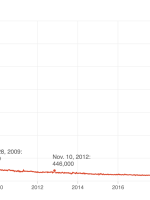Ignoring pressure from President Trump to keep the oil flowing, OPEC, Russia and other producers have agreed to cut production. They pledged to pare output by 1.2 million barrels a day, hoping to stem a sharp drop in oil prices.
The price of crude jumped nearly 4.5 percent Friday morning, to $53.75 per barrel, on word of the agreement, which called for a bigger reduction than analysts had expected.
Oil prices had plummeted 30 percent in recent weeks as supplies grew and signs emerged of a slowing global economy.
Gas prices have dropped, too. The national average for regular is $2.44 per gallon, down 30 cents from a month ago, .
Friday's deal came despite a barrage of tweets from President Trump urging OPEC and Saudi Arabia, its most powerful member, to hold down prices.
Hopefully OPEC will be keeping oil flows as is, not restricted. The World does not want to see, or need, higher oil prices!
— Donald J. Trump (@realDonaldTrump) December 5, 2018
"Hopefully OPEC will be keeping oil flows as is, not restricted," Trump tweeted on Wednesday. "The World does not want to see, or need, higher oil prices!"
In November, the president tweeted: "Hopefully, Saudi Arabia and OPEC will not be cutting oil production. Oil prices should be much lower based on supply!"
But OPEC and its partners moved ahead with plans to cut production after meetings this week in Vienna. Iran, under pressure from sanctions, won an exemption from the cut.
As S&P Global Platts reported:
"OPEC has committed to 800,000 [barrels per day] in output cuts, and 10 non-OPEC producers led by Russia will slash another 400,000 b/d for six months beginning January, under a preliminary deal reached Friday after two days of tense negotiations.
"Iran, Libya and Venezuela will be effectively exempt from the cuts, though the text of the deal will say they received 'special considerations,' Iraqi oil minister Thamir Ghadhban said."
OPEC is getting stiff competition from increased oil output in the U.S., which is now producing more oil than any other country. Production in places such as North Dakota is booming, thanks to fracking and horizontal drilling.
Copyright 2020 NPR. To see more, visit https://www.npr.org.



